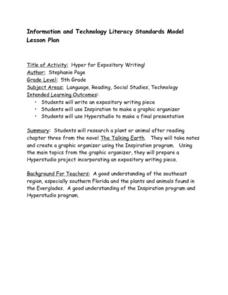Curated OER
Polishing the Petoskey
Students select a stone and polish it. Throughout the process they demonstrate an understanding of rocks and fossil formation.
Curated OER
Food and Fiber: Helping the Environment and You
Fourth graders explore the many uses of corn-based products and the importance of water resources. They consider how biodegradable products help to keep water clean. They perform experiments to observe how corn pellets dissolve while...
Curated OER
Oh, California: Understanding Primary Sources: What Did John Muir See?
Students read a selection from the writings of John Muir. They discover his view on California and its natural resources. They create a display of images that show what California has to offer.
Curated OER
Make a Cast of a Tyrannosaurus rex Fossil
Second graders examine the formation of fossils and list the different types. They make cast model of a dinosaur fossil. They write about conditions that are necessary for fossils to form and create a model of a buried fossil.
Curated OER
Do You See What I See?
Pupils hypothesize the role of rocks, soil, and water by observing a terrarium and create a model to explore the water cycle. This is part of a five station set up.
Curated OER
Hyper for Expository Writing!
Fifth graders use the internet to research a plant or animal they read about in "The Talking Earth". Using notes, they develop a graphic organizer and use the main topics to create a HyperStudio stack. Using all of this information,...
Curated OER
Snail Observation Exercise
Learners are given a pond snail in a clear glass and asked to make observations on the snail's form and behavior. One of the key ideas is that seemly common subjects (like snails) often have surprising or interesting properties.
Curated OER
Using Science to Explore - Science Worksheets
In this science exploration worksheet, students will compare the differences between science and technology. Students will come up with a way to use technology to explore a deep well. This worksheet has 7 short answer questions.
Curated OER
Polishing the Petoskey
Students polish a Petoskey stone to show how to make an attractive rock display. In this polishing rocks lesson plan, students use sand paper and polishing materials to polish a rock and remove the rock dust. This is to display a nice...
Curated OER
Evolution
Young scholars create a timeline on the history of evolution. In this biology lesson, students research their assigned scientist's contribution to evolution theory. They write a three-paragraph analysis about the timeline.
Curated OER
The Formation of Soil
Students identify the different components that make up soil. In this earth science lesson, students create a pamphlet for next year's class. They analyze how erosion and weathering shape the Earth.
Curated OER
Introduction to Ecology
Eighth graders identify the living and nonliving components of an ecosystem. In this ecology lesson, 8th graders explain the role each organism plays. They participate in class discussion and answer a quiz at the end of the lesson.
Curated OER
Pollination
Fourth graders explore the pollination process. For this plant biology lesson, 4th graders dissect a flower to identify the parts of a flower and watch a video to see seed dispersal. Students write about the pollination process.
Curated OER
Earth's Atmosphere and Temperature
Students explore the layers of earth's atmosphere and conduct an experiment to identify carbon dioxide. They construct models using styrofoam to represent molecules in the atmosphere's layers. To discover how sunlight efffects...
Curated OER
Corals and Coral Reefs
Students label the continents, oceans, and seas on a provided world map and use it to determine where they would expect most of the world's coral reefs to be found based on provided information the teacher has read to them.
Curated OER
Secrets of the Ocean Realm - Survival in the Sea
Students determine the sequential links in a marine food chain and identify the roles that various organisms play in this chain. Students develop charts as visual aids for illustrating marine food chains.

















